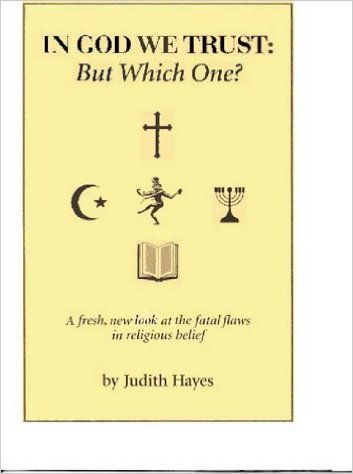
IN GOD WE TRUST: BUT WHICH ONE?
BY JUDITH HAYES (PUBLISHED 1996 BY FFRF, MADISON, WI. 223 pages)
There are countless books available critiquing Christianity, theology, and religion in general. Some of these are scholarly philosophical texts designed for professional evaluation while others are more oriented for skeptical laypersons.
In God We Trust: But Which One? is more of the latter type, which is not to say that there is a lack of scholarly research and information contained between its covers: there most certainly is. Author Judith Hayes has compiled a number of articles she wrote for the periodical Freethought Today into an engaging text which should delight skeptics of revealed religion.
Like Dan Barker, Skipp Porteus, and many others, Hayes is a former believer. She decided to bolster her faith by reading the Bible cover to cover. Appalled by its contents, she began the slow process of de-conversion.
The title refers to the simple fact that since the world’s religious systems contradict one another, they cannot be referring to the same god. To cite one example, Hayes illustrates the schizoid nature of Christianity with comments such as : “A Roman Catholic worships a god who speaks through the Pope while a Baptist worships one who does not. They cannot be the same god.”
The absurdity and futility of prayer is made evident when Hays tells us: “When you thank god for the food on your table you are saying that god put it there. A necessary component of this premise, the other side of this coin, is that if there is no food on your table, god is responsible for that too.” The same god that the devout thank for placing Thanksgiving turkey on their tables is withholding supper from the starving people of Bangladesh and other impoverished areas. How do believers rationalize this? To be consistent, they should be cursing this god for causing so much suffering when he, supposedly being omnipotent and omniscient, is certainly able to relieve hunger and suffering. Why the double standard?
Hayes’ sarcastic wit serves her well throughout the book. One example of this is seen in her chapter entitled, “The Good Book.” After informing us that General Norman Schwartzkopf attributed the success of Operation Desert Storm to the fact that god was on our side, Hayes says: “Isn’t that great? God actually rolled up his sleeves and helped us kill 150,000 Iraqis.”
I have always maintained that the religious indoctrination of children is a form of child abuse. Hayes illustrates this point beautifully by noting: “The fact that the Hitler Youth’s movement succeeded so well should be evidence enough that any sort of dogmatic indoctrination of children before they reach the age of reason is simply immoral.”
These few examples should be evidence enough of Judith Hayes’ insight and ability to turn a phrase. In God We Trust: But Which One? is at once entertaining, informative, and erudite while at the same time delivering devastating blows to religious orthodoxy. It is a must for any free thought library.
Categories: Book Reviews
